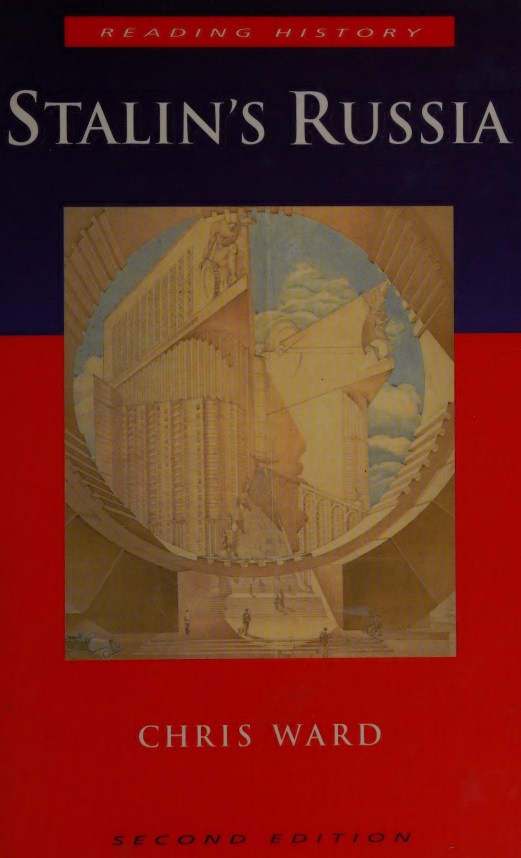Chris Ward. Stalin’s Russia.
Londres: Arnold, 1993.
2da edición, 1999.
300 páginas.
Contents
Introduction
Recovering Stalin’s Russia
Building history
The pre-glasnost’ source base
The post-glasnost’ source base
Suggestions for further reading
1 – The rise of Stalin, 1917-1929
Narrative
Stalin to 1922 — The leaders in power — The triumvirate and the semerka — The defeat of the Left — The defeat of the Right
Interpretations
The heroic approach — The administrative approach — The party history approach — The ideological approach — The socio-cultural approach — The Trotskyist approach
Evaluations
Personality — Intentionality — Two legacies — Looking for Napoleon — The evolution of the party-state — The intra-party struggle – Why Stalin?
Suggestions for further reading
2 – Industrialization, 1924-1941
Narrative
The industrialization debate — The planning agencies — The birth of the first piatiletka — The first piatiletka in action — The crisis of 1932-1933 — Drafting the second piatiletka — ‘Three good years’ — 1937 and the third piatiletka
Interpretations
NEP versus piatiletka — Social and political causes — Plan fulfilment — Living standards — Forced labour — Society in turmoil — The party, engineers and workers
Evaluations
Ideology and history — The dilemmas of industrialization — The nature of planning — Social history
Suggestions for further reading
3 – Collectivization, 1927-1941
Narrative
The smychka under strain — The end of the NEP – Dekulakization — ‘Dizzy with success’ — The new order — Famine — Sovkhozy and kolkhozy — 1933-1941
Interpretations
Stalin centre stage – Economic dilemmas — Economic dilemmas revisionized — Popular support – Human costs — Economic results
Evaluations
Russian imperatives — Ideologies and realities — Stalin and the grain crisis – The view from below — The impact of collectivization — The longue durée
Suggestions for further reading
4 – Purges and politics, 1928-1941
Narrative
Stalin under attack — The localities under attack — The Kirov Affair — The Stalin constitution — The first show trials – The February-March plenum — The Great Purge Trial – The Ezhovshchina — The eighteenth party congress — The ‘spring of liberalism’
Interpretations
The Soviet view — Totalitarianism — Marxist variants — Revisionism — Stalin, Kirov and Ezhov — Social pressures — Structuralism — Ezhov unleashed — The Stalinist polity — The victims
Evaluations
Past and present — Counting terror — Early Bolshevism — Theorizing terror — The culture of terror — The Old Bolsheviks — The Caliban state – Antecedents and parallels — Stalin’s rôle
Suggestions for further Reading
5 – Foreign policy and the Comintern, 1922-1941
Narrative
Stabilization and Rapallo — Coexistence and the war scare — China and the Guomindang — Social fascism and the third period — The West and Manchuria — Collective security and popular fronts — Spain and Japan — Litvinov’s fall — Alliance with Hitler
Interpretations
Approaching the Comintern — Bolshevization — China — The Comintern in the 1930s — The coming of war — The Taylor thesis — Germanists — The internal politics school
Evaluations
Approaching foreign policy — International dilemmas — China, Narkomindel and the Comintern — Russia and Germany — The Nazi-Soviet pact — The border wars
Suggestions for further reading
6 – War and late Stalinism, 1941-1953
Narrative
The Great Patriotic War — The nationalities — The economy — The party-state — The Grand Alliance – The Cold War
Interpretations
Defeat and victory — The negative view — The positive view — 1945-1953 — Social history — Traditionalism and revisionism — Neo-revisionism and after
Evaluations
The people’s war — After the deluge — Late Stalinism
Suggestions for further reading
7 – Culture and society, 1928-1953
Narrative Education — Religion and ethnicity — Law — Social policy — Literature, science and the arts — The Zhdanovshchina
Interpretations
Totalitarianism revisited — Revisionism revisited — Revolution and retreat
Evaluations
The problem of culture — State and ideology — State and society — Ideology and society — Massification and atomization — Tradition and meritocracy — Ideology and high culture
Suggestions for further Reading
Conclusion: History and Stalin’s Russia
Tout comprendre, c’est tout pardonner
The successes of history
The failures of history
Suggestions for further reading
